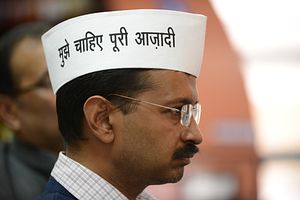On Valentine’s Day, Delhi’s Chief Minister decided to break up with the people of Delhi. 49 days ago, the activist-turned-politician Arvind Kejriwal started his alliance with the citizens of the national capital by taking his oath as the youngest CM of the city state. He conducted a referendum on whether he should assume power or not and voters overwhelmingly wanted him in the seat of power. But on Friday Kejriwal resigned without consulting the people – the common men of Delhi – thereby breaking his promise of bringing about a change in governance.
The immediate reason for his exit is his abortive attempt to introduce an anti-corruption bill in the legislative assembly. The combined opposition blocked the introduction of the bill on the grounds that it is unconstitutional, as it does not have the prior approval of the federal government. Delhi, being a city state, needs the approval of the central government on some matters before a bill is introduced in the legislative assembly.
But Kejriwal’s minority government was not willing to go by the book and introduced a tough piece of anti-corruption legislation which he knew had little chance of approval due to opposition from both the Bharatiya Janata Party (BJP) and the Indian National Congress (INC).
Kejriwal’s critics say that the he was looking for an opportunity to exit the office of Chief Minister, which was proving too much for an inexperienced governor as himself. He has been battling one crisis after the other in his less than two months in office, thereby considerably damaging his middle-class support base in the nation’s capital.
By sacrificing his chair on the issue of corruption, Kejriwal wants to assume the halo of martyrdom and victimhood at the same time.
The AAP was born of the popular anti-corruption movement that started in 2011. Kejriwal, in the company of the veteran crusader Anna Hazare, was the most vocal face of the protests. It was largely on the anti-corruption plank that the rookie political party won 28 out of 70 seats in the Delhi legislative assembly elections, thereby emerging as second largest party after the BJP which won 32 seats. However, with the backing of the Congress Party, the AAP formed a new government in the last week of 2013.
Since day one, the going has been tough for the AAP government, with some of its populist measures proving politically unsustainable. Kejriwal’s defense of his erring law minister, Somnath Bharti, who was alleged to have crafted policy based on racial prejudices against African women, angered many in the intelligentsia and many women activists. The constant media scrutiny and complete lack of any economic vision to govern the city alienated many of the AAP’s ardent middle-class supporters. The media, which had initially been very supportive of the new party, became critical of the functioning of the government. The CM was looking for an opportunity to escape from the unwelcome circumstances that engulfed the new government.
The anti-corruption bill provided that breathing space and an excuse for his exit.
It goes without saying that the AAP is eying the upcoming parliamentary elections. The party has announced its intention to field candidates for 350 Lok Sabha seats. Kejriwal wants to present himself as a victim of a conspiracy by the mainstream political parties like the Congress and the BJP. AAP wants to flaunt its anti-corruption campaign among the people and sell the idea of a corruption-free India. How far people will see Kejriwal as a martyr is open to debate.
But after forty-nine days at the top in Delhi, the AAP’s Achilles heel has been exposed. It’s unclear how many seats the anti-corruption party will win in the parliamentary elections. It has, however, the potential to damage the prospects of the ruling Congress.
Critics say that Kejriwal’s rise has affected the appeal of the BJP’s prime ministerial candidate, Narendra Modi. The anti-corruption activist has taken away some of the middle-class constituency of the controversial right-wing leader. Leaders of the nascent party now publicly say that the main contest in the 2014 elections is between the BJP and the AAP. Over the last few weeks, the AAP in Delhi has been targeting the right-wing leader constantly.
But the AAP’s innocence is no longer intact. It has largely lost its initial appeal among the people as a new sort of political offering. Therefore, its performance in the upcoming elections in India will also determine the longevity of the party.
Kejriwal’s calculated exit from the office of Chief Minister has taken some of the sheen away from the party which not long ago was seen as Delhi’s saving grace.
































